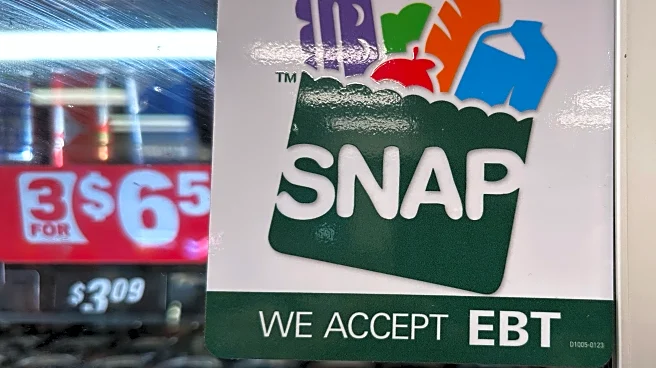BOSTON (AP) — President Donald Trump ’s administration asked a federal appeals court Friday to block a judge’s order that it distribute November’s full monthly SNAP food benefits amid a U.S. government
shutdown, even as at least some states said they were moving quickly to get the money to people.
The judge gave the Trump administration until Friday to make the payments through the Supplemental Nutrition Assistance Program. But the administration asked the appeals court to suspend any court orders requiring it to spend more money than is available in a contingency fund, and instead allow it to continue with planned partial SNAP payments for the month.
The court filing came even as Wisconsin said Friday that some SNAP recipients in the state already got their full November payments overnight on Thursday.
“We’ve received confirmation that payments went through, including members reporting they can now see their balances,” said Britt Cudaback, a spokesperson for Democratic Gov. Tony Evers.
The court wrangling prolonged weeks of uncertainty for the food program that serves about 1 in 8 Americans, mostly with lower incomes.
An individual can receive a monthly maximum food benefit of nearly $300 and a family of four up to nearly $1,000, although many receive less than that under a formula that takes into consideration their income. For many SNAP participants, it remains unclear exactly how much they will receive this month, and when they will receive it.
Jasmen Youngbey of Newark, New Jersey, waited in line Friday at a food pantry in the state’s largest city. As a single mom attending college, Youngbey said she relies on SNAP to help feed her 7-month-old and 4-year-old sons. But she said her account balance was at $0.
“Not everybody has cash to pull out and say, ‘OK, I’m going to go and get this,’ especially with the cost of food right now. It’s now possible,” she said.
Tihinna Franklin, a school bus guard who was waiting in the same line outside the United Community Corporation food pantry, said her SNAP account balance was at 9 cents and she was down to three items in her freezer. She typically relies on the roughly $290 a month in SNAP benefits to help feed her grandchildren.
“If I don’t get it, I won’t be eating,” she said. “My money I get paid for, that goes to the bills, rent, electricity, personal items. That is not fair to us as mothers and caregivers.”
Because of the federal government shutdown, the Trump administration originally had said SNAP benefits would not be available in November. However, two judges ruled last week that the administration could not skip November’s benefits entirely because of the shutdown. One of those judges was U.S. District Judge John J. McConnell Jr., who ordered the full payments Thursday.
In both cases, the judges ordered the government to use one emergency reserve fund containing more than $4.6 billion to pay for SNAP for November but gave it leeway to tap other money to make the full payments, which cost between $8.5 billion and $9 billion each month.
On Monday, the administration said it would not use additional money, saying it was up to Congress to appropriate the funds for the program and that the other money was needed to shore up other child hunger programs.
Thursday’s federal court order rejected the Trump administration’s decision to cover only 65% of the maximum monthly benefit, a decision that could have left some recipients getting nothing for this month.
In its court filing Friday, Trump’s administration contended that Thursday’s directive to fund full SNAP benefits runs afoul of the U.S. Constitution.
“This unprecedented injunction makes a mockery of the separation of powers. Courts hold neither the power to appropriate nor the power to spend,” the U.S. Department of Justice wrote in its request to the court.
In response, attorneys for the cities and nonprofits challenging Trump's administration said the government has plenty of available money and the court should "not allow them to further delay getting vital food assistance to individuals and families who need it now.”
Some states said they stood ready to distribute SNAP money as quickly as possible.
The Michigan Department of Health and Human Services said it directed a vendor servicing its SNAP electronic benefit cards to issue full SNAP benefits soon after the federal funding is received.
Benefits are provided to individuals on different days of the month. Those who normally receive benefits on the third, fifth or seventh of the month should receive their full SNAP allotment within 48 hours of funds becoming available, the Michigan agency said, and others should receive their full benefits on their regularly scheduled dates.
Meanwhile, North Carolina’s Department of Health and Human Services said that partial SNAP benefits were distributed Friday, based on the Trump administration's previous decision. Officials in Illinois and North Dakota also said they were distributing partial November payments, starting as soon as Friday for some recipients.
In Missouri, where officials had been working on partial distribution, the latest court jostling raised new questions. A spokesperson for the state Department of Social Services said Friday that it is awaiting further guidance about how to proceed from the U.S. Department of Agriculture, which administers SNAP.
Amid the federal uncertainty, Delaware's Democratic Gov. Matt Meyer said the state used its own funds Friday to provide the first of could be a weekly relief payment to SNAP recipients.
On Thursday, Nebraska's Republican Gov. Jim Pillen downplayed the impact of paused SNAP benefits on families in his state, saying, “Nobody’s going to go hungry.” The multimillionaire said food pantries, churches and other charitable services would fill the gap.
___
Lieb reported from Jefferson City, Missouri, and Bauer from Madison, Wisconsin. Associated Press writers Margery Beck in Omaha, Nebraska; Mike Catalini in Newark, New Jersey; Jack Dura in Bismarck, North Dakota; Mingson Lau in Claymont, Delaware; John O'Connor, in Springfield, Illinois; and Gary D. Robertson in Raleigh, North Carolina, contributed to this report.









